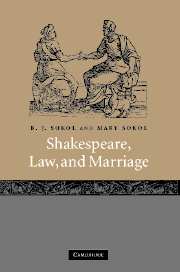Book contents
- Frontmatter
- Contents
- Acknowledgments
- List of abbreviations: Shakespeare titles
- Introduction
- 1 Making a valid marriage: the consensual model
- 2 Arranging marriages
- 3 Wardship and marriages enforced by law
- 4 Financing a marriage: provision of dowries or marriage portions
- 5 The solemnisation of marriage
- 6 Clandestine marriage, elopement, abduction, and rape: irregular marriage formation
- 7 The effects of marriage on legal status
- 8 Marriage breakdown: separation, divorce, illegitimacy
- 9 'Til death us do part
- An afterword on method
- Notes
- Bibliography
- Index
6 - Clandestine marriage, elopement, abduction, and rape: irregular marriage formation
Published online by Cambridge University Press: 22 September 2009
- Frontmatter
- Contents
- Acknowledgments
- List of abbreviations: Shakespeare titles
- Introduction
- 1 Making a valid marriage: the consensual model
- 2 Arranging marriages
- 3 Wardship and marriages enforced by law
- 4 Financing a marriage: provision of dowries or marriage portions
- 5 The solemnisation of marriage
- 6 Clandestine marriage, elopement, abduction, and rape: irregular marriage formation
- 7 The effects of marriage on legal status
- 8 Marriage breakdown: separation, divorce, illegitimacy
- 9 'Til death us do part
- An afterword on method
- Notes
- Bibliography
- Index
Summary
THE PROBLEMS OF CLANDESTINE MARRIAGE
Any marriage that failed to meet all of the Church's demands for solemnisation was termed clandestine; this description therefore covered a large variety of ways in which unsolemnised consent could be given. In Shakespeare's time there was also considerable dispute about the particular form of the Prayer Book solemnisation required by English law.
As we have said, even though the teaching of the Church of Rome was that marriage was a Holy Sacrament (or, in the Prayer Book of the Church of England, ‘an honourable estate’), a failure to go through church solemnisation of a marriage was not fatal to its validity. Instead a clandestine marriage was treated as valid but a sin, and was punished as such in the church courts. Erring parties were usually ordered to comply with Prayer Book regulations for solemnisation and to do penance, and priests involved could be punished by suspension or loss of living. Such an outcome was unsatisfactory to many people. Wealthy families and patriarchs wanted more control over children's marriages. The more conservative Protestant reformers deplored the lack of regulation and wanted the validity of marriage controlled by the Church. Other Puritan reformers disagreed and objected to any clerical involvement at all in marriage. The clerical establishment complained about the activities of poor unbeneficed priests working outside Church hierarchies for profit. Common lawyers and Protestant reformers both complained that the church courts were insufficiently active in punishing those who flouted the law.
- Type
- Chapter
- Information
- Shakespeare, Law, and Marriage , pp. 93 - 116Publisher: Cambridge University PressPrint publication year: 2003

